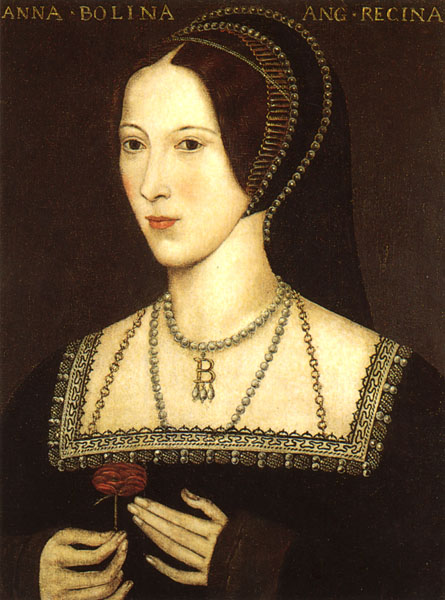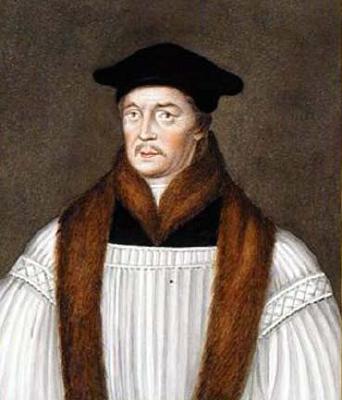 |
| Anne Boleyn |
The King’s Great Matter
Anne had not
forgotten what she perceived as Wolsey’s deliberate slight of her when, in
1523, he had been involved in the delaying of her proposed marriage to James
Butler. Henry had not informed her that it was he, Henry, who had delayed the
marriage negotiations. Anne’s grandfather, the Duke of Norfolk, was an enemy of
Wolsey’s and he too was more than happy to be involved in Wolsey’s downfall. Norfolk
was trusted by Henry for his astute judgement and ruthless expediency[i].
Anne had
withdrawn from court some months earlier, now her demands were being met she
returned. Henry did not hide his love for her; Anne was given a splendid
apartment and beautiful clothes and jewels. Through all this Katherine waited
patiently believing that she, like ‘patient Grizelda’ could outlast
Henry’s infatuation.
As soon as
Henry had Anne’s consent to the marriage he informed Thomas;
‘To whom we may be sure the
news was not a little joyful’[ii]
Once the
King’s Great Matter was underway Anne, the object of so much of the court’s
attention, decided to return to Hever. In July 1527 Wolsey left for France;
Henry hoped to enlist François’ support. He had not informed Wolsey of his
intention to marry Anne and it was while he was in France that Wolsey heard the
rumours which horrified him.
In August
Thomas, Anne, Norfolk and Suffolk were all Henry’s guests at Beaulieu; the
Boleyn faction warned Henry that Wolsey was in actuality working to prevent the
Pope granting the annulment that Henry so desperately desired. When Wolsey
returned in September it was to report that the mission had been a failure.
Doubt now entered the relationship between servant and master.
Family Affairs
 |
| Cardinal Wolsey |
In 1528
Wolsey pronounced in favour of Thomas over the question of the Earldom of
Ormond. But it was far too late for him to curry favour in that direction; Anne’s
father was as implacably opposed to Wolsey as Anne was. She couched her enmity
with a cover of friendship, writing to Wolsey promising her favour when she was
queen;
‘Anything in this world I
can imagine to do you pleasure, you shall find me the gladdest woman in the
world to do it.’[iv]
Mary’s
husband William was a victim of the sweating sickness that did the rounds in
the summer of 1528; Henry had fled to the country to escape the contagion. On
22nd June Wolsey noted;
‘This night, as the king
went to bed, word came of the death of William Carey.’[v]
Mary was
left homeless and applied to Thomas for help. Her father ignored her pleas and
refused to see her. After the intervention of Henry, who informed Anne;
‘I have caused Walter Walshe[vi]
to write to my Lord [Thomas] mine mind therein……it cannot so stand with his
honour, but that he must needs take her, his natural daughter, now in her
extreme necessity.’[vii]
Thomas was
shamed by his monarch into taking Mary back under his roof and Mary returned to
Hever to live with her daughter, mother and insane grandmother. Later Henry
gave Mary an allowance of £100 per annum[viii]. In July Anne was given
the wardship of Mary’s three year old son.
By the
autumn Anne’s family and supporters were spreading rumours to the effect that
Wolsey was secretly working for Katherine. Anne left the queen’s service in
July and Wolsey was ordered to find a house for Anne. The house in London was
made ready for Anne by Thomas, as comptroller of the king’s household. He ensured
that Anne’s new home was fit for a queen.
The Papal Court
 |
| Charles V |
In 1529 Thomas was one of Henry’s envoys at a
meeting with Charles V and Pope Clement VII seeking support for the annulment
of Henry’s marriage. This was followed by another envoy to France. Anne had
convinced Henry that Wolsey was not prosecuting the suit for divorce as
energetically as Henry might have wished.
The pope
decided that he would institute a papal court to hear Henry’s demand for an
annulment of his marriage. The papal legates, Cardinal Campeggio[ix]
and Wolsey convened their court
on 30th May 1529; both Henry and Katherine gave evidence. Her case
was argued by John Fisher[x], the Bishop of Rochester.
Henry was
infuriated by the opposition and one night Wolsey was awakened by Thomas who informed
him;
‘Repair unto the queen at
Bridewell, into her chamber, to persuade her by their wisdoms, advising her to
surrender the whole matter unto the king’s hands by her own will and consent,
which should be much better to her honour than to stand to the trial of law and
be condemned.’[xi]
On 23rd
July Campeggio informed an infuriated Henry that he had to discuss the matter
with the pope before he could give his verdict. Henry walked out in disgust.
The verdict could take years to be delivered and, as Henry knew, if it was
delivered in Rome it would be in Katherine’s favour. Spain’s new ambassador Eustace Chapuys hoped to bring about a reconciliation between Henry and
Katherine.
The Fall of Wolsey
 |
| Stephen Gardiner |
Wolsey’s influence was on the wane and his position
as the king’s most trusted servant was taken by Stephen
Gardiner, now the king’s secretary. And France, the great
hope of Wolsey’s foreign policy, was treating with Charles in a conference at Cambrai between François’s mother Louise and Margaret of Austria. Wolsey was
defamed to Suffolk, the English envoy, and Henry, bored of foreign policy failed
to take advantage of the ensuing treaty to further England’s interests. He was
too focussed on the need for a divorce to worry about the future gains Wolsey
was so patiently working towards.
Wolsey’s influence on affairs was now much
diminished and on 9th October, after Campeggio’s departure for Rome[xii],
the king’s attorney sued for a writ of praemunire[xiii] against Wolsey on the grounds that as a legate he had contravened his
statutory duties.
 |
| Thomas More |
On 16th October
Norfolk and Suffolk demanded that Wolsey hand over the Great Seal and that he move to his house in Esher. Henry made Thomas More, a lawyer and devout churchman, his new Lord Chancellor. Before
his departure Wolsey admitted that he had contravened praemunire and his goods and chattels were now forfeit[xiv].
His new household lacked even sheets for the beds, let alone money to pay the
staff.
In desperation, able to see the future as well as
any of Henry’s victims; in November Wolsey wrote to Henry;
‘For surely, most gracious king, the remembrance of
my folly, with the sharp sword of your Highnesses’ displeasure hath so
penetrated my heart that I cannot but lamentable cry, It is enough; now stay,
most merciful king, your hand.’[xv]
Henry
allowed Wolsey to keep his archbishopric of York and placed him under his personal
protection.
 |
| James Butler |
On 8 December 1529 the king made his faithful servant
Thomas Boleyn Earl of Ormond[xvi] and Wiltshire. Henry arranged for the other claimant to the
earldom of Ormond, Piers Butler, to renounce all his claims to the titles; Butler
was rewarded by being created Earl of Ossory five days later. At the same time George, was
granted the courtesy title of Viscount Rochford, so lately used by his father[xvii].
To celebrate Thomas’s elevation
Henry gave a banquet at Whitehall where the new Lady Anne Boleyn, took
precedence over all the other ladies of the court. Chapuys wrote;
‘It seemed as if nothing were wanting but the
priest to give away the nuptial ring and pronounce the blessing.’[xviii]
Bibliography
Cardinal
Wolsey – Mandell Creighton, McMillan & Co 1891
Thomas
Cromwell – Robert Hutchinson, Phoenix 2008
Henry VIII –
Robert Lacey, George Weidenfeld & Nicholson & Book Club Associates 1992
The Earlier
Tudors – JD Mackie, Oxford University Press 1992
Thomas More
– Richard Marius, Weidenfeld & Nicholson 1993
Rivals in
Power – David Starkey (ed), Toucan Books 1990
The Six
Wives of Henry VIII – Alison Weir, Pimlico 1992
Mary Boleyn
– Alison Weir, AudioGO Ltd 2012
www.wikipedia.en
[i]
Qualities missing in his son, grandson and great grandson
[ii]
The Six Wives of Henry VIII - Weir
[iii]
16th century biographer of Anne’s and grandson of her admirer Thomas
Wyatt
[iv]
The Six Wives of Henry VIII - Weir
[v]
Mary Boleyn - Weir
[vii]
Mary Boleyn - Weir
[viii]
In 2013 the relative: historic standard of
living value of that income or
wealth is £45,110.00
economic
status value of that income or
wealth is £1,232,000.00 economic power value
of that income or wealth is £15,480,000.00 www.measuringworth.com
[x]
Later executed for failing to accept Henry as head of the church in England
[xi]
Cardinal Wolsey - Creighton
[xii]
Campeggio took with him Henry’s letters to Anne, stolen by one of his
associates and now held in the Vatican archives
[xiii]
A law prohibiting the assertion or maintenance of papal jurisdiction, imperial or
foreign, or some other alien jurisdiction or claim of supremacy in England,
against the supremacy of the monarch.
[xv]
Cardinal Wolsey - Creighton
[xvi]
Boleyn's claims to the Earldom of Wiltshire depended upon his Irish
relatives. He had to go back to his maternal great-grandfather, James Butler, 5th Earl
of Ormond, to establish a claim. While James Butler was the
1st Earl of Wiltshire (of the third creation), on 1 May 1461 he lost his
titles, along with his head, when he was executed by the victorious Yorkists. The title was subsequently revived (in fourth and
fifth creations) and bestowed on parties unrelated to the Butlers of Ormond.
[xvii] It ceased
to be a mere courtesy title sometime before 13 July 1530.
[xviii]
The Six Wives of Henry VIII - Weir
No comments:
Post a Comment
Note: only a member of this blog may post a comment.